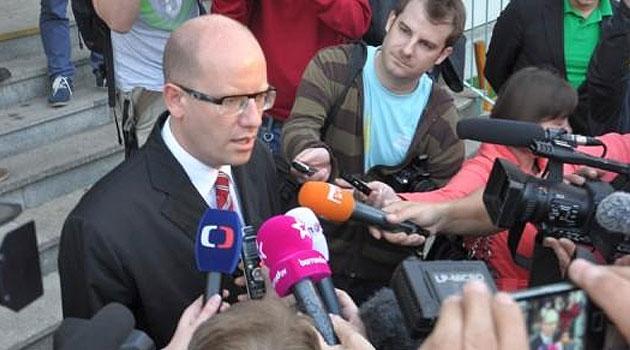Czech Social Democratic chair considering Human Rights Minister in new cabinet

On Saturday, 14 December at a meeting of the Central Executive Committee of the Czech Social Democratic Party (ČSSD) in Prague’s Congress Center, the party as expected approved a coalition agreement with the ANO movement and the Christian Democrats. Party chair Bohuslav Sobotka told journalists there will be no further referendum inside the party.
Sobotka said the ČSSD will now negotiate with their coalition partners on a fair division of cabinet seats. News server iDNES.cz reports that Sobotka is considering including a minister without portfolio for human rights in the government.
The Central Executive Committee, comprised of about 180 people, was asked to confirm several resolutions. One approved the post-electoral process undertaken by Sobotka and his negotiating team.
Another resolution agreed that the ČSSD should join the government under the program conditions outlined. The Christian Democrats are reportedly not satisfied with the first proposal on the division of cabinet posts, which describes them receiving only two, ČSSD eight and the ANO movement, seven.
"My opinion has not changed," said Sobotka, emphasizing that he was prepared to be generous. "We as a party see the need to form a new government as soon as possible."
The ČSSD chair went on to say he was considering including a Minister for Human Rights in the government. "That is one of the options, I am considering it," he told news server iDNES.cz.
A total of 40 nonprofit organizations have sent an open letter to the incoming coalition government calling for the establishment of a Human Rights Ministry. They justified their call with reference to the unbearable situation in socially excluded localities, the rise in displays of right-wing extremism in society, and the long-term lack of interest by previous governments in these problems.
The NGO plan has been supported by former Human Rights Ministers Michael Kocáb, Džamila Stehlíková and many other figures. Michaela Marksová-Tominová, who since August 2010 has been the ČSSD’s Shadow Human Rights and Equal Opportunities Minister, also agrees with the nonprofit initiative.
"I agree with this initiative. ‘Human rights’ are not just an empty concept that intellectuals write reams of paper about. It has to do with the fates of real people, children included, which can be very sad, even tragic, and unless we build a system to protect their rights, as is common in every developed country, no one will help them. The most-discussed part of the human rights agenda concerns socially excluded Romani people. Their situation continues to deteriorate, in at-risk regions social tensions are rising. Right-wing extremist parties are gaining strength all over Europe. It is high time we begin addressing this issue comprehensively and systematically, the state cannot just leave the burden to the municipalities. This issue doesn’t belong completely under just one ministry, there is a need for close collaboration, primarily between the Educatin Ministry, the Interior Ministry, the Social Affairs Ministry, and the afflicted municipal and regional administrations… If the person taking care of this issue is not a cabinet member, the concern exists that the other ministers will not take it as seriously as is needed," Marksová-Tominová told the weekly magazine RESPEKT.
Czech MP Ivan Gabal, a sociologist who has just been elected for the Christian Democrats, agrees with the establishment of this position. "It would be better to actively establish now, not to establish it under pressure two years from now when the problems mentioned in the [NGO] call have escalated further. An argument for establishing the post can be seen when we compare the effectiveness in addressing social tensions between the Nečas government and the Topolánek government, when Topolánek still had a minister for this agenda and Nečas no longer had one," Gabal told RESPEKT.
The MP considers it a specious argument to claim that establishing such a ministry would cost too much. "The Agency for Social Inclusion has at the moment a budget of around CZK 25 million per year, and scaling its agenda up to the level of a ministry would evidently not exceed CZK 350 million. For police riot units to stay in a place where unrest is going on costs CZK 150 million for one month alone," Gabal said.
Czech MP Jaroslav Faltýnek, the chair of the ANO faction in the lower house, is against establishing a Human Rights Ministry. "It is not our aim to increase the number of ministries. We believe a new Human Rights Ministry will not resolve the situation," he told RESPEKT.
"The work of local Labor Offices must be improved, their active role in job-seeking must be enhanced, and their obligation to disburse unemployment benefits must be taken away. The disbursal of welfare must be conditioned on the fulfillment of several conditions such as their children’s school attendance or their coexistence with their neighbors, why not? Monitoring of the disbursal of welfare must be increased," Faltýnek said.
Sobotka said on Saturday that he intended to agree on a date to begin negotiations about the distribution of cabinet posts with the chairs of the ANO movement and the Christian Democrats, Andrej Babiš and Pavlem Bělobrádek, that very day. The meeting would be held "as soon as possible" after Bělobrádek returns from the United States.
The ČSSD chair added that the negotiators evidently anticipate a "somewhat more frenzied" Christmas. The program section of the coalition agreement approved by the party on Saturday was slated to be approved by the Christian Democrats Sunday and by the ANO movement today or tomorrow.
Sobotka pointed out that if he were to listen to all of the motions by the party presidency and Central Executive Committee, the ČSSD would insist on controlling all of the ministries, but said he had not heard those bodies demand the right to approve or disapprove the composition of the cabinet and that the party had never proceeded in such a way previously. "That’s within the powers of the chair," he said.